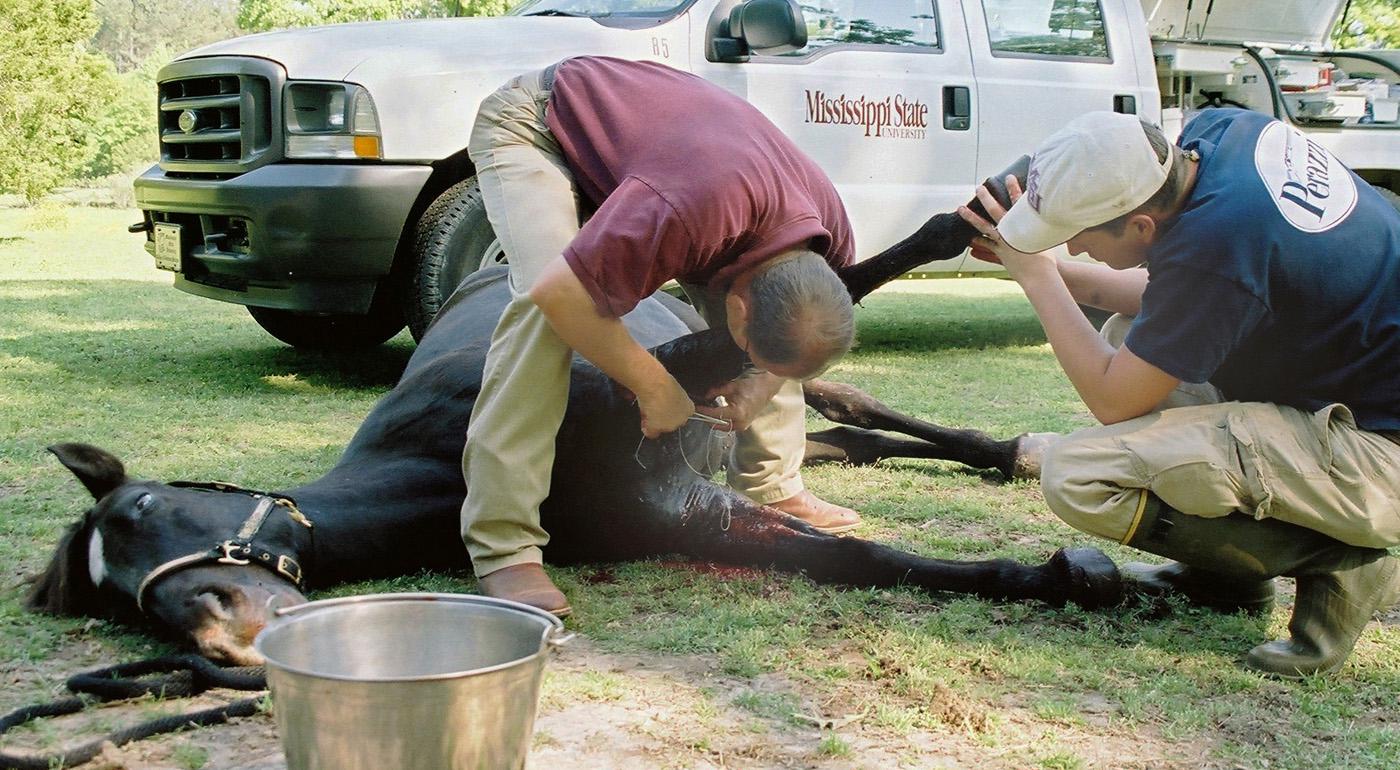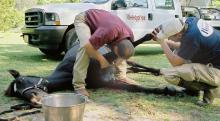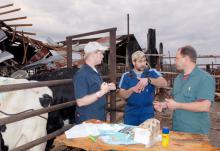Information Possibly Outdated
The information presented on this page was originally released on September 25, 2008. It may not be outdated, but please search our site for more current information. If you plan to quote or reference this information in a publication, please check with the Extension specialist or author before proceeding.
Large animal service helps owners, students
MISSISSIPPI STATE -- The College of Veterinary Medicine's ambulatory service is catching on as a win-win opportunity for Mississippi State University students and owners of large animals in the Starkville area and beyond.
Dr. David Christiansen, assistant professor in the Department of Pathobiology and Population Medicine, is spearheading the mobile service, which got under way in the fall of 2007. A fully equipped truck is available to take veterinarians and students off campus for routine or emergency care of horses, cattle, small ruminants and swine.
“We are slowly expanding our efforts as news of our availability is spreading by word of mouth,” Christiansen said. “Since the college was opened, we have done ‘field services' that largely addressed the university's animal needs and a small number of clients.”
The ambulatory service helps students learn how to run a large-animal, private practice. Fees are similar to prices charged by private practitioners. Christiansen, a 1989 MSU doctor of veterinary medicine graduate, worked in a large-animal practice for 12 years in Hinds County doing mostly ambulatory services.
“Our goal at MSU is to have a farm-call practice that simulates an actual ambulatory practice,” Christiansen said. “We want to teach students real-world aspects away from an institutional setting. As we travel to client premises, we discuss issues related to private practices, such as the cost of equipment and travel, how to set fees and communication skills to use with clients.”
Dr. Jim Brett joined the ambulatory service last fall. The Kosciusko native earned his doctor of veterinary medicine degree from MSU in 1983. After graduation, Brett ran a mixed animal practice in Georgia and was a columnist for Dairy Herd Management magazine.
“The ambulatory program allows students to experience more real-world, large-animal situations. They perform physical exams, use technical skills and treat animals under the supervision of a clinician,” Brett said. “I hope the ambulatory experience will benefit all students no matter what type of practice they enter.”
Brett said most care and treatment decisions are made before obtaining any laboratory data.
“The students generate theories, rule out problems and list therapy options for the owner based on our experience of the most probable cause,” he said. “If they choose to do lab work, I make sure each test is really necessary since all testing costs the client money.”
Brett said he tries to incorporate practice management information into the program, including how to charge for services, what it costs to operate an ambulatory truck, and inventory and other basic considerations. Students also get to interact with clients and learn communication skills they will need after graduation.
“If students wish to run a large-animal or mixed practice, they need this information to be successful business people,” he said.
Christiansen said the horse industry in the counties surrounding MSU has increased significantly in recent years. The number of veterinarians available to serve large animals has not.
“This area is booming. As human populations and services expand, it only follows that the equine community will grow as well,” he said. “We hope to attract trainers and others with an interest in developing horse businesses in this area with animal care to accommodate their needs.”
Dr. Nancy Jackson, a 1990 MSU graduate who runs a private practice ambulatory service out of Eupora, said the university's service complements the care provided by local veterinarians. One opportunity she had to work with the unit occurred last spring after a tornado hit a dairy barn in Choctaw County during milking time.
“It was comforting to know MSU was able to respond in a disaster. The sheer number of animals involved and the labor needed was overwhelming. We were working on four animals at a time,” Jackson said. “It is good to know they are available as a backup if I am unable to respond to a call.”
Christiansen said the unit has an emergency management emphasis and remains ready to respond to any disaster.
Contact: Dr. David Christiansen, (662) 325-1348





